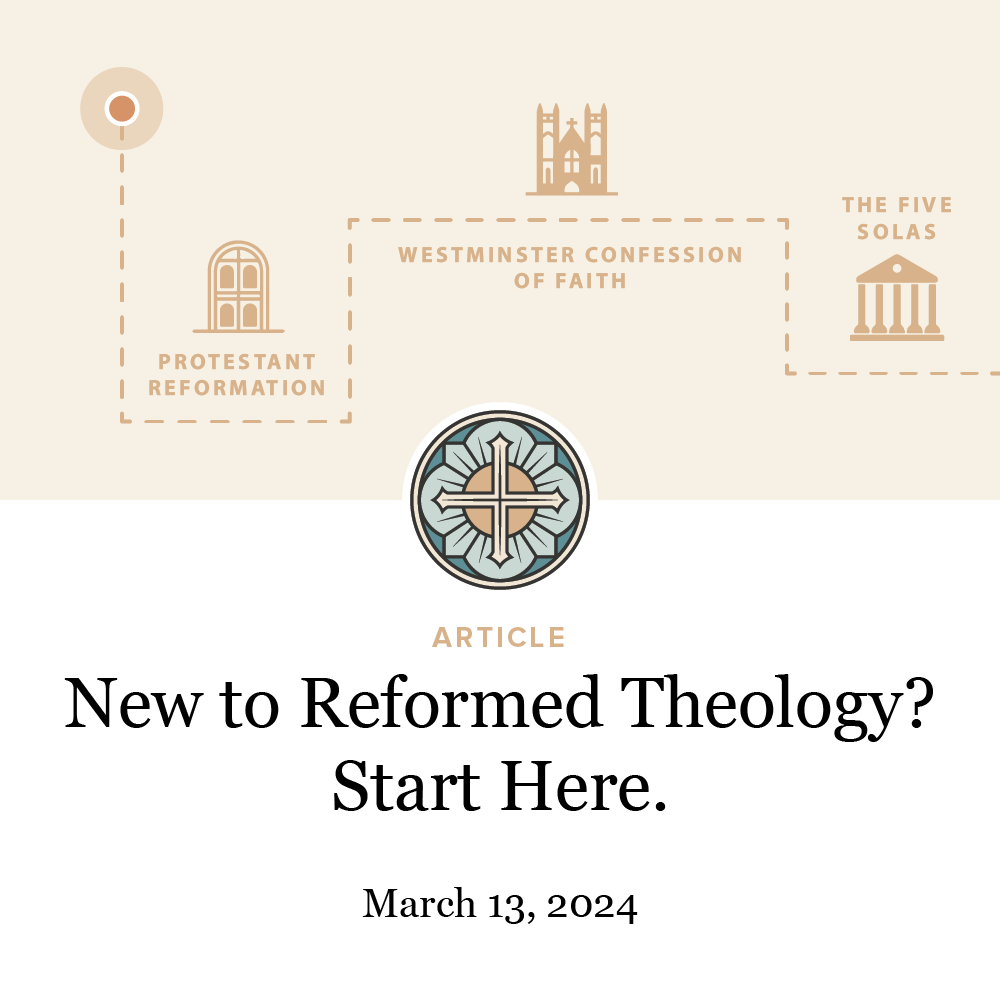New to Reformed Theology? Start here.
Whether it’s through a close friend, relative, neighbor, pastor, author, YouTuber, or podcaster, there are many ways in which you may have first heard of Reformed theology.
And when you did, it may have been like Lucy Pevensie stepping through the wardrobe to Narnia – you couldn’t return to the way things were. The Bible, the gospel, and grace were seen afresh through the clear, Biblical lens of Reformed Theology.
But what is Reformed Theology?
Some people associate it solely with election and predestination. Some think of Martin Luther and his 95 theses or John Calvin and the five points of Calvinism. Many think of the five solas or the Reformation or covenant theology.
There are many components to Reformed Theology. And now, more than ever, there are numerous resources on the topic. The amount of information can be overwhelming. Where do you even begin?
If I were brand new to Reformed Theology, here is where I would start.
1. Study the Bible
The Protestant Reformation was a back to the Bible movement. The reformers studied God’s Word, allowed Scripture to interpret Scripture, and articulated the truths of the Bible in confessions.
The more you read and study God’s Word, the more you will discover the tenets of Reformed Theology because it outlines biblical Christianity.
There are many helpful study Bibles out there but the best one is The Reformation Study Bible. Not only does it have helpful notes; it also contains introductions to every book of the Bible, includes great articles on a variety of theological topics, and has printed many of the most widely used Reformed creeds and confessions in the back.
2. Study the history of the Reformation
Understanding the Reformation as a historical, back to the Bible movement is an important component to better understanding Reformed Theology.
Many of the Reformers vehemently disagreed with a variety of theological positions held by the Roman Catholic Church. They disagreed on everything from justification to worship. If you have some understanding of background, issues, and controversies, you will have a better understanding of Reformed Theology.
A short accessible introduction to the history of the Reformation is The Unquenchable Flame by Michael Reeves. In The Unquenchable Flame, Reeves gives his readers an informative, engaging, (and at times, laugh out loud) arrangement of the history of the Reformation.
3. Read Reformed confessions
As the Reformers and their students continued to clarify their convictions, they wrote confessions which were detailed summaries of Biblical Theology.
The most widely referenced confessions are first and foremost the Westminster Confession of Faith, along with the Westminster Larger Catechism and Westminster Shorter Catechism.
In addition to the Westminster Standards, The Three Forms of Unity – The Heidelberg Catechism, The Belgic Confession, and The Canons of Dort – were some of the most widely utilized Reformed confessions.
Reading each of these confessions and catechisms will deepen your understanding of Reformed Theology.
4. Read introductions to Reformed Theology
Finding a succinct definition for “Reformed Theology” is a tremendous challenge. If you talk to ten different people you’ll get ten different answers.
Thankfully, several pastors and theologians have sought to define Reformed Theology and explain the central doctrines of it. These summaries can be incredibly helpful when first learning about Reformed Theology.
Two of the most helpful introductions are: Reformed Theology by Jonathan Master and What is Reformed Theology? by R.C. Sproul.
Both introductions seek to provide a concise overview of Reformed Theology without compromising on the depth of their explanations.
5. Read about Covenant Theology
Covenant Theology primarily deals with the relationship between the Old and New Testaments. It will give you the interpretative framework that other Reformed doctrines hang on, like infant baptism or the Lord’s Supper.
The best, straightforward, classic view of Reformed Theology is The Fulfillment of the Promises of God: An Explanation of Covenant Theology by Dr. Richard Belcher.
6. Dive into more Reformed Resources
Online Publications
Ligonier Ministries, the ministry of the late Dr. R.C. Sproul, has incredibly helpful articles and video series. They have an online print digest publication, Tabletalk, which you can read online as well. Both Ligonier and Tabletalk’s articles and videos come from a distinctly Reformed perspective.
Seminary Lectures
Lectures and classes are available on the Reformed Theological Seminary App on everything from the History of Christianity I to the Theology of the Westminster Standards.
Publishers
A few publishers that regularly print Reformed books are: Westminster Bookstore, Reformation Heritage Books, and Banner of Truth.
Biblical Commentaries
Biblical commentaries like Matthew Henry’s Complete Commentary and Calvin’s Commentaries are all available online for free.
Systematic Theology
Reading systematic theology is a way to dive deeper into Reformed Theology as well. Some of the most helpful ones are Calvin’s Institutes of the Christian Religion, Francis Turretin’s Institutes of Elenctic Theology, and Herman Bavinck’s Reformed Dogmatics.
Reformed Worship
Worship is another important aspect of Reformed Theology. Some good introductions to Reformed Worship are In the Splendor of Holiness by Jon Payne and Reformed Worship by Terry Johnson.
Of course this list isn’t exhaustive, but it isn’t supposed to be — it’s a starting point. May it be helpful for you as you dive further into the depths of Reformed theology but more importantly, into God’s Word.




